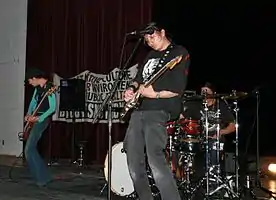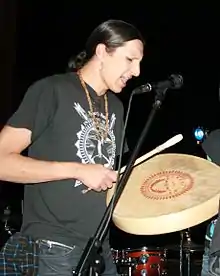Blackfire (American band)
Blackfire is a Native American punk rock group. Composed of three siblings: two brothers and a sister, their musical style is influenced by traditional Navajo Diné music and alternative rock, with political messages about government oppression and human rights. In 2012, members formed the band Sihasin.
Blackfire | |
|---|---|
 Blackfire at "The Unsung Heros of Time '09" concert Kayenta, AZ | |
| Background information | |
| Origin | Flagstaff, Arizona, U.S. |
| Genres | |
| Years active | 1989–present |
| Website | blackfire |
| Members | Klee Benally Jeneda Benally Clayson Benally |
History
Beginnings (1989–1993)
Blackfire was founded in 1989 by Jeneda, Klee, and Clayson Benally, three siblings born in the heart of the land struggle at Black Mesa on the Navajo Nation. Their mother was a folk singer, and their father, Jones Benally, was a traditional medicine man who raised them on traditional Native songs. Not surprisingly, their children followed suit and have been playing music since "their instruments were bigger than they were."[1] To this very day, Jones and his children perform as the Jones Benally Family, either as a part of or separately from Blackfire performances, which are always at all-ages venues, to display their "traditional form of dance, song and story that has been carried on from the beginning of time...including histories of ceremonys [sic], hunting, agriculture and the foundation of the Diné Culture."[2]
Release of EPs (1994–2001)
Though they began performing in 1989, Blackfire did not record any of their music until their uniquely substantial and energetic music got the attention of punk rock godfathers The Ramones. In 1994, C.J. Ramone produced a 5-song EP that became their debut album released on their label Tacoho Productions. It also included musical contributions by their father Jones and by renowned American Indian flutist Robert Tree Cody. Four years later, they released another EP, this time producing it on their own and only releasing three new songs instead of five. In 1999, they received a NAMA nomination for Best Independent Release. Two years after that accomplishment, they embarked on a European tour, gaining more support along the way.
One Nation Under and Woodie Guthrie Singles (2002–2003)
By the end of 2002, they released their first LP One Nation Under. Produced by Don Fleming, producer for Sonic Youth and Joan Jett, and once again featuring their father doing traditional vocals, the album is described as "15 passionately burning songs of struggles, resistance, and hope."[3] The song "No Control" was used in the "New Mexico, Old Monster" episode of What's New, Scooby-Doo?. It is also the last project that Joey Ramone, who dubbed Blackfire's music as "fireball punk-rock," contributed to before he died due to lymphoma. On the album, he provided additional voicing for the songs "What Do You See" and "Lying to Myself." That same year, they won the NAMA Best Pop/Rock Album award. Fleming was also nominated for Best Producer. One Nation Under is available through Canyon Records.
For the following 5 years, the sibling trio of Blackfire decided to do some interesting renditions of songs and traveled to some exotic places. In 2003, they journeyed to Essakne, Mali in northern Africa. Their performance was included in the compilation album Festival in the Desert, alongside performances by local Tuareg musicians, African musicians like Ali Farka Toure, and Robert Plant of Led Zeppelin. That same year their political activism attracted the attention of Nora Guthrie, daughter of legendary folk singer Woody Guthrie (1912–1967). She allowed them to set music to some of his unreleased and unpublished lyrics. By next year, they released a two-track EP titled Woody Guthrie Singles. The songs on the EP are called "Mean Things Happenin' in this World," a protest song dealing with issues like wars waged for fortune and encroachment of rights by the federal government, and "Indian Corn Song," a song about "political and big business corruption, the poor economy, and ends with a plea to feed the homeless and orphans."[4]
Vans Warped Tour and [Silence] Is a Weapon (2004–2008)
In 2005, their dual disk CD/DVD release Beyond Warped had not only their live tracks from the 2004 Vans Warped Tour, but also two covers of Ramones' songs only previously on an Argentinean tribute album Todos Somos Ramones: "I Believe in Miracles" and "Planet Earth 1988." They also won NAMA Group of the Year in 2005 for Woody Guthrie Singles. Two years later, they released their latest album [Silence] is a Weapon. As a dual-disc set featuring their usual brand of hardcore punk rock on one and Jones Benally Family Diné music on the other, it is truly a juxtaposed album that also shows a more comprehensive aspect of the band. "It is very separate [stylistically] but to us it is a whole concept that encompasses what our life is" says Jeneda, while Klee explains, "I think the traditional songs are maybe even more important for kids to hear than the rock songs, but they both speak of the same things – respect for the earth and society, remember your roots."[5] In 2008, [Silence] is a Weapon won NAMA's Album of the Year and Ed Stasium, the producer of the album, received the Native Heart Award that "recognizes significant contributions of non-Native folks to Native American music."[1]

Band members
- Clayson Benally – percussion, vocals (1989–present)
- Jeneda Benally – bass guitar, vocals (1989–present)
- Klee Benally – vocals, guitar (1989–present)
Discography
- Blackfire (Five-song E.P., 1994)
- Blackfire (Three-song E.P., 1998)
- One Nation Under (2001–2002)
- Woody Guthrie Singles (2003).[6]
- Blackfire – Beyond Warped: Live Music Series (CD/DVD, 2005)
- [Silence] Is A Weapon (2007)
References
- "B L A C K F I R E". Archived from the original on 21 September 2009. Retrieved 21 September 2020.
- "Indigenous People". Archived from the original on 2008-04-04. Retrieved 2009-08-18.
- "Virtual Mayhem". Instantmayhem.com. Retrieved 21 September 2020.
- "Indian Country Today". Indiancountrytoday.com. Retrieved 21 September 2020.
- Woodyguthrie.org. The Woody Guthrie Singles – Blackfire. Archived July 19, 2007, at the Wayback Machine Retrieved Nov. 7, 2007.
Other sources
- Vincent Schilling (1 November 2011). Native Defenders of The Environment. Native Voices Books. pp. 76–. ISBN 978-1-57067-995-7.
- Brian Wright-McLeod (2005). The Encyclopedia of Native Music: More Than a Century of Recordings from Wax Cylinder to the Internet. University of Arizona Press. pp. 61–. ISBN 978-0-8165-2448-8.
- Michelle H. Raheja (1 January 2011). Reservation Reelism: Redfacing, Visual Sovereignty, and Representations of Native Americans in Film. U of Nebraska Press. ISBN 978-0-8032-6827-2.
- David King Dunaway Professor of English University of New Mexico; Molly Beer freelance writer University of New Mexico (14 April 2010). Singing Out : An Oral History of America's Folk Music Revivals: An Oral History of America's Folk Music Revivals. Oxford University Press, USA. pp. 168–. ISBN 978-0-19-970294-7.
- Bruce E. Johansen PhD (22 September 2015). American Indian Culture: From Counting Coup to Wampum [2 volumes]: From Counting Coup to Wampum. ABC-CLIO. pp. 564–. ISBN 978-1-4408-2874-4.
- Russell M. Lawson (2 April 2013). Encyclopedia of American Indian Issues Today. ABC-CLIO. pp. 688–. ISBN 978-0-313-38145-4.
- Elaine Keillor; Tim Archambault; John M. H. Kelly (27 March 2013). Encyclopedia of Native American Music of North America. ABC-CLIO. pp. 181–. ISBN 978-0-313-05506-5.
- Eunice Rojas; Lindsay Michie (8 October 2013). Sounds of Resistance: The Role of Music in Multicultural Activism. ABC-CLIO. pp. 42–. ISBN 978-0-313-39806-3.
- American Indian Culture and Research Journal. American Indian Culture and Research Center, University of California. 2008.
- Living Blues. 171–175. Center for the Study of Southern Culture, The University of Mississippi. 2004. pp. 42–.